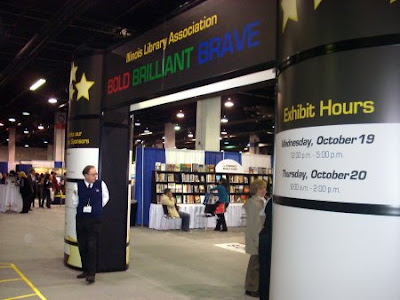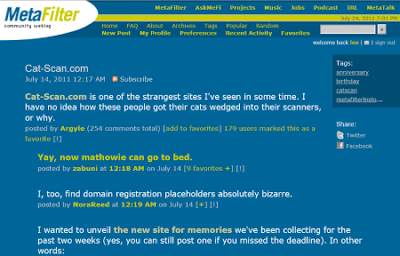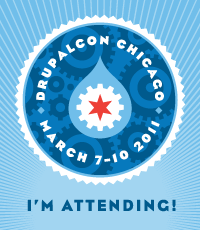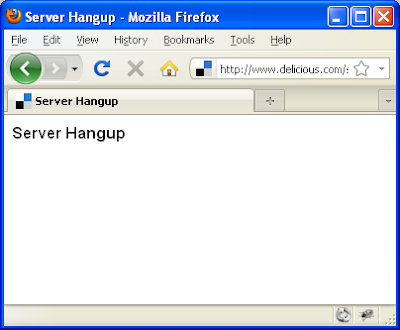Not much fun at the moment. Working on a big web design project (with a deadline).
Friday, December 30, 2011
Monday, December 26, 2011
Holiday Readings
Ethan Marcotte on the inadvisability of setting up a purely mobile site:
"...Fragmenting our content across different 'device-optimized' experiences is a losing proposition, or at least an unsustainable one. As the past few years have shown us, we simply can't compete with the pace of technology. Are we going to create a custom experience for every new browser or device that appears?"
Friday, December 02, 2011
Concert in Evanston with Stew
Tuesday, November 29, 2011
Dominick's Won't Have None of It
Current Cites for November 2011 is out! You can find the issue here...
I've got two 'cites' this month: one on Libraries moving to Drupal and another on the use (or non-use as the case may be) of Library Subject Guides by college students.
Monday, November 28, 2011
Tell Me Something I Don't Know
Can it be called research when these are the results?
"The analysis revealed that Facebook offers a dynamic environment for academic libraries to cultivate relationships with students. Libraries present information through status messages which suggest who they are and what they do. In addition to being informational, libraries attempt to engage and establish rapport with students through Facebook. The university setting not only creates a context for messages, but also offers a mutual set of experiences and values shared by libraries and students."
Wednesday, November 16, 2011
Is It Really Mobile?
Josh Marshall, publisher of Talking Points Memo, looks at traffic on his site and points to the still modest but continually increasing share that 'mobile' is taking:
"The additional wrinkle here is that 77% of that mobile traffic you see in the chart is from iOS devices, i.e., iPhones, iPads, iPods, etc. So give or take, around 40% of the visits to TPM come from computers or devices that use an operating system built by Apple. Compare that to 20% only 5 years ago."
The question is, is this really mobile? iPads for example are far more likely to be connected via wireless rather than through a phone company and screen-wise, it's a whole different user-experience. For purposes of analysis, I think it'd be far more helpful -- in fact, increasingly so -- to approach the data as 'mobile' AND 'tablet'.
Wednesday, November 09, 2011
Thank You, Flash, for Showing Us the Way!
Everyone's assuming, for this reason, that Flash's days are numbered. And well they may be, in which case, there's no better time to extol its virtues -- particularly the contribution it's made to our online world -- than now.
It's important to remember that before the Web, most communication online was largely through command line input. In fact, one of the great 'side' achievements of the WWW was that it liberated us from this tyranny, giving us a 'graphical user interface' instead. In the library world, this was the difference between DIALOG which only a consultant could make head or tail of and current versions of Ebsco or Proquest.
Flash (and its predecessor, Shockwave) took this a step further by introducing a far higher level of interactivity. It allowed us to click on things, enlarge them, drag them across the browser window. It allowed us to better coordinate various types of media -- images, audio and video -- into a unified user experience. In fact, it did this with video so well that many people nowadays think of Flash as primarily a video delivery system.
And maybe it is, or was. Things move on. What we used to do in Flash, we're slowly being able to accomplish using Javascript, CSS and eventually HTML5. That's the path -- but it was Flash that showed us the way.
In Berlin When the Wall Came Down
I was in Berlin when the Wall came down. In fact I had been living there since 1984.
I had just woken up from an early evening nap when one of the people from the Wohngemeinschaft where I was living told me the Wall had come down.
This seemed strange since it looked perfectly intact only an hour before when I had gone to sleep.
Of course my room-mate was exaggerating. In fact, the Wall hadn't come down -- it had simply opened up. You still had to show your ID to get through. There was one or maybe two cross-points. These are important distinctions which I'll get back to in a moment but at that point it really didn't matter. I like everyone rushed out to welcome the incoming East Germans at Checkpoint Charlie, buying a bottle of Sekt (German sparkling wine) along the way.
East Berlin in the Bad Old Days
East Berlin up to that point had principally been a source of cheap booze and tyranny. It was drab beyond imagination. Other than official communist exhortations plastered on walls here and there, there was absolutely no advertising -- or color of any kind.
Of course, the people living there knew what was going on. They had access to the same radio and tv we did. The Wall surrounded West Berlin but it was the 'Ossies' as they were called who were trapped.
Long Weekend
By the time we got to Checkpoint Charlie that night, there already was a huge number of people. It seemed like the East Germans were being processed in lots. Every time a group came through, people would cheer.
Some that night came over just to have a look. They clogged the buses and U-Bahn. It was extremely difficult for the next three days to get into the center of the city. In front of all the banks, there were huge lines of East Berliners waiting to pick up their Begrüßungsgeld (Welcome Money) of 100 DM. They used this money to buy oranges and radio-cassette players -- things they couldn't get in East Berlin.
Everywhere there was this extraordinary sense of euphoria -- summed up best by Walter Momper, mayor of West Berlin, when he called Germans "das glücklichste Volk auf der Welt" (happiest people in the world).
When the Wall Came Down for Me
As days turned into weeks, more and more entry ways were opened between the two parts of the city. The Brandenburg Gate was opened in December. You still had to show your ID to get through but the level of scrutiny became less and less.
I remember one particularly sunny day several months later -- it may even have been summer -- when I was going through the new entry point at Mariannenplatz and there didn't seem to be anyone around. I kept waiting to be stopped at some point as I moved further across -- first through the West Berlin side, and then through the East Berlin side -- but again there was no one. I simply walked through! It was the first time I had been able to do this. That's when the Wall truly came down for me.
Postscript
I never got into taking a hammer to the Wall. It was something I was glad to leave up to the tourists. And I don't really know what I'd do with a chunk of the thing any more than I'd know what to do with a pair of handcuffs from the Stassi or a uniform or hat.
I don't need those things. It's enough to remember what the people I met back then had to endure and that no matter how free-wheeling and wild we were on our side of the Wall (west), that there was a fully-certified police state just a block away (east).
That was the Berlin I knew. By the time of the unification, it was clear that the city and country were embarking on a new chapter.
It was time for me to leave. I had been in Europe for more than ten years, six of them in Berlin. I witnessed the unification ceremony near the Reichstag and flew back to the United States the next day.
Saturday, October 22, 2011
Yes, Virginia, Deep Dish Pizza is Real Pizza
Here we go again. Everyone's talking about the following comment by Supreme Court Justice Anthony Scalia:
[Chicago's Deep Dish Pizza is] ... "very tasty ... but it should not be called ‘pizza.’ It should be called ‘a tomato pie.’ Real pizza is Neapolitan. It is thin. It is chewy and crispy, OK?”
Here's the third report I've come across, this time in the Chicago Sun-Times.
This is a complete myth based on ignorance of what qualifies as 'pizza' in Italy. It's not just thin crust! Naturally that's what you get if you only go to sit-down pizzerias but there are also places, particularly in Rome or Naples, called 'Pizza Rustica' which are walk-in carry-out places where you can order elaborate thick-crush pizzas that put our Deep Dish variety practically to shame. These are the forerunner of Deep Dish! It's there for anyone to go and see.
Another example is 'Pizza Bianca' which is a staple of good Italian breakfasts -- served up practically at every Cafe/Bar in the country: a totally plain very thick crust which is filled with cheese and other delicious things and then toasted and served crispy hot along with your cup of cappuccino. Again, a harbinger of Deep Dish.
So I'm sorry, but this really is a sort of idiot test: if someone doesn't like Deep Dish or claims it's not Italian, bingo, they win the Bozo Award!
Wednesday, October 19, 2011
Big Day: Work Then Library Conference Then Drupal Meetup
Today was a big day. I started it off at MPOW with a meeting at 9am sharp. At noon I left for Rosemont and the Illinois Library Association Conference. They were featuring not only a free pass to get in to see the exhibits but a free lunch as well: carved roast beef and turkey along with two kinds of pasta and either a tomato or cream sauce. Heaven! Following a quick stop home, I next headed downtown for the monthly meeting of the Chicago Drupal Meetup Group. The meeting this month was starting early because they had three people giving presentations instead of the usual 2. One was on the switch to Drupal over at the Field Museum.
Thursday, October 06, 2011
My First Mac
Friday, September 30, 2011
Search Box Syndrome
We've been here before -- from a usability study looking at how students use (or don't use as the case may be) various library database pages:
"In 2006, Steve Krug said internet users were mostly looking for something clickable to click on; BGSU students, by contrast, often looked for a search box to search in. When a search was unsuccessful, instead of retooling it, the student looked for a different search box and tried the same search again. The students in the study tried to change the subset of information they were searching, not the search they had already decided was the best one."
Okay, so the next logical question might be, is this a student preference or is there something about the design of the website that drives them to it? Maybe yes, maybe no but considering the effort we put into all of this, it's certainly worth testing.
But hark! A bit further down in the same study -- apparently vendor consolidation will save the day:
"Therefore, if we want students to use a wider range of our resources, it is crucial that we teach them to recognize the resources that will be useful for them. As the brand diversity of our resources narrows, vendors and publishers merge, and vendors market more and more to end users, this strategy may become easier to adopt."
Sunday, September 11, 2011
9/11 -- All I Had to Do Was Turn Around
Everyone has their own story about 9/11; here's mine.
I was living on 12th St. between Avenues A & B in lower Manhattan. That day, a Tuesday, was like any normal work day. I was getting up, listening to the radio. Suddenly reports started coming in of an airplane crashing into one of the towers at the World Trade Center.
How could this have happened? I had just been there on the preceding Saturday if only to use the bathroom in the basement. The twin towers were a prominent fixture in the skyline whenever I looked south. How could something like this have happened?
Speculation on WNYC, the radio station I was listening to, ran the gamut from pilot error to intentional attack. One way or the other it was still too early to tell. Then the second plane hit and all doubt was put to rest.
I left the apartment stunned.
As I walked up 1st Ave., I ran into people equally as stunned. Many stared in my direction or beyond me further down the street. One woman just leaned against the wall crying. She didn't move or go anywhere. All she did was look down the street. I turned my head to see what she was looking at and it dawned on me: everything I was feeling up to now was based on what I had heard on the radio but there behind me in the distance, as visible in the skyline as always, were the actual towers, only now burning and giving off huge plumes of smoke.
It's this association -- the association with the literal horror of what I had only been hearing about -- that I'll never forget.
And what to do? The only thing I could think of was to go to work and in a sense 'report for duty'. Not that there was that much to do once I arrived. For most of the day, I followed the news as best I could. On occasion the Internet would go down. In lower Manhattan, the subways were shut down so at one point thousands and thousands of people flooded the streets, all walking north, trying to get home.
Next day pretty much everything shut down. You couldn't get south of 14th St without an I.D. due to a police cordon. Getting south of Houston was unthinkable. I went to Washington Sq. and Union Sq. Something stood out that seemed to exemplify the utter tragedy of this event -- something I couldn't find links to online which meant quite possibly that few outside of New York were aware of it. I posted the following comment on the popular group blog at the time, Metafilter:
"To Those Not in New York City: You can walk down the streets of Manhattan and see handbills taped to the streetlights with the pictures of loved ones, their names, a sentence saying they were last seen in one of the WTC towers and, lastly, contact information just in case anyone has seen them. (I don't have a link for this but this describes the one I saw at Lafayette and Astor)."
It was very quiet in Manhattan. It would remain so for many weeks to come.
Thursday, September 08, 2011
Beginning of Fall Quarter 2011 at DePaul
Picture of your's truly at the Ref Desk on my first day at least of Fall Quarter 2011. Lots of questions about whether we have textbooks for classes (generally we don't). Plus to add to the excitement, our Chat Reference pooped out for a couple of hours.
Last but not least, Are These Fighting Words? -- a shot of the flavors available at the Bean Coffee Stand at DePaul including the (controversial) "Decaf Librarian's Blend".
Saturday, September 03, 2011
Move In Day at DePaul
Actually I think it's move-in weekend. The quarter doesn't start till next Tuesday but people are moving in already. I saw one guy with this huge large-screen tv maybe 5' x 6' that probably cost a fortune in the 1990s. It's strange to think he's moving that monster into his dorm.
P.S. The sign says,
"LOADING ZONE: Please limit your time in this space to 20 minutes so that other students can move in. Thank you."
Wednesday, August 31, 2011
Current Cites for August 2011
Current Cites for August 2011 is out! You can find the issue here... [see also the CurrentCites website]
I wrote about an issue of Libraries & the Cultural Record that looked at libraries during the Depression and contains this rather depressing report on the state of the Chicago Public Library by its Chief Librarian at the time:
"We are afflicted by the worst financial hardship we have ever suffered.... We have bought no books for eight months, the magazine subscriptions for 1932 were cancelled."
Wednesday, August 24, 2011
It's not the People that are Stupid, It's the System!
 Okay, I've got way too many things on my plate at the moment to go through this report, "Ethnographic Research in Illinois Academic Libraries (ERIAL) Project" but Sarah Kessler in a write-up for Mashable sums it up thusly:
Okay, I've got way too many things on my plate at the moment to go through this report, "Ethnographic Research in Illinois Academic Libraries (ERIAL) Project" but Sarah Kessler in a write-up for Mashable sums it up thusly:"Students in a two-year ethnographic study referred to Google more than any database when discussing their research habits. But ironically, say the study’s authors, they weren’t very good at using it."
Now, as a librarian and lifelong user of Google, I know you can limit it (kind of) by date or content type (eg book, article, image) plus a thousand other fancy things using a minus sign ('-') or quotes, etc. but should requiring knowing these things always -- or ideally -- be the ticket of entry? Doesn't sound very Google-ly to me.
Kessler in the Mashable write-up quotes one student:
"I know there are books but I don’t really know how to find them. Really the only thing I know how to do is go to Google and type in what I’m looking for."
My reaction was, I dunno. Sounds more to me like 'system fail' rather than 'people fail'. Ideally all that user should have to do is go to Google and type in what he or she is looking for. That at least is what I'd consider the 'Holy Grail'.
Monday, August 22, 2011
1st Day - UIC Fall 2011
Wednesday, August 03, 2011
NY Times ArtsBeat Blog: Stew in Africa: A Long Time Coming
"Pathetic Eurocentric Negro!" That's how Stew, an old pal of mine from my Berlin days begins an account of his first trip ever to Africa. He's working as one of the creative advisers for a program in Kenya that coaches upcoming African theater people. He's also agreed to share his experiences by posting regularly on the New York Times' ArtsBeat Blog. Stew was the lead guitarist of a good-time band we had in Berlin called 'The Wonderful Guise'. Tony Millionaire was also a member of the group. Anyway, it's good to see Stew maintaining the spirit of those free-for-all wild times in passages like this:
The workshop I'm giving on Manda will probably consist of a song by song analysis of the Rolling Stones 1966 release "Between the Buttons" which I'll compare and contrast with "King Lear," even though I've never read "King Lear" and I'm almost certain absolutely no connection between the two works actually exists. But Sundance can handle this sort of thing.
You can read the whole post here...
Friday, July 29, 2011
Sunday, July 24, 2011
MetaFilter - Happy 12th Anniversary!
MetaFilter was the original community blog. It's where everyone went to discuss everything from web design to politics. Last week it celebrated its 12th Anniversary.
The site was originally put together by Matt Haughey and frequented by techies. There was a lot of discussion in the early days about web design and development. Adherents of Jacob Nielsen and web designers would trade barbs particularly over the use of Flash (hence the 'Flash Wars'). This was a dispute not settled until the arrival of more reasonable adherents of usability like Jared Spool who knew how to speak to designers and thus had a far more positive impact.
Later on as membership grew, topics of more general interest such as news and politics became more prominent. MetaFilter was where we went to discuss the fall-out from the Bush-Gore election results in 2000 as well as the aftermath following 9/11.
Anyway, the local alternative weekly where Matt Haughey lives in Portland has run an interesting article on him called, "The Blogfather". Also, MetaFilter has its own page of user-submitted reminiscenes called, "MetaFilter Memories".
Tuesday, July 19, 2011
Give Me a Chicago Butt - Or No Butt at All!
Monday, July 11, 2011
When Design Gurus Clash: Edward Tufte vs. Don Norman
I was going through an interesting article on (quantitative) design guru Edward Tufte when I came across this interesting spat between him and (simplicity) design guru, Don Norman that -- despite a cheap shot by Tufte -- seems to wonderfully address polar opposites:
"Some designers have questioned whether Tufte's reverence for elegance and accuracy can verge on dogmatism, with too little consideration of context or audience. "The world is not filled with professional statisticians," said Donald Norman, the codirector of the Segal Design Institute at Northwestern University and the author of The Design of Everyday Things. "Many of us would like a quick glance just to get a good idea of something. If a graph is made easier to understand by such irrelevancies as a pile of oil cans or cars, then I say all the better." (Tufte deflects this criticism by pointing out that Norman has been a paid consultant to Microsoft; Norman says his consulting work has nothing to do with his own thinking and writing.) "
Sunday, July 10, 2011
'Er Kommt' - Or My Short Stint as a False Prophet
Of the many encounters I had in Berlin recently, one of the more interesting was with a woman who I had never met before. It was at the Bauhof Anniversary Party and she came up and gave me a photo which she had taken over twenty years earlier.
The photo was of a poster of me with the words, 'Er Kommt' (i.e. 'He's coming'). She had seen the poster plastered all over the neighborhood and like a few others at the time, had interpreted it as the harbinger of some significant event.
The truth was far more mundane. I had spent much of the year (1987) in New York and when Tony Millionaire heard I was coming back, he grabbed a photo of me from my expired passport, enlarged it and proceeded to paste photocopies of it all over Kreuzberg. So I guess you could say it was a significant event -- but more along the lines of Tony Millionaire finally getting his American drinking buddy back. I hope she wasn't disappointed.
Friday, July 01, 2011
Monday, June 20, 2011
Hommage à Madame - 21 Rue Soufflot, Paris
Saturday, June 18, 2011
Blast from the Past (1985): Tech-savvy Educators Choose ... LaserDisc!
"Rapidly changing technology confronts an educator with difficult choices in selecting new equipment. Will today's state-of-the-art equipment be tomorrow's Edsel? Obviously, educators must be careful in choosing a particular technology, making certain that it will play an important functional role in the educational system. The Laser Videodisc system is such a technology."*
________
*Schwartz, Ed. "The Educator's Handbook to Interactive Videodisc" (1985), p1.
Thursday, June 16, 2011
Frankie Z's RIP
Wow, Frankie we hardly knew ya. Thanks to all the staff for so many years of good times. This was a place where you could just go and relax. It'll always be a favorite.
Thursday, May 26, 2011
The End of Apple is Upon Us
Sunday, May 22, 2011
Rumors of RSS's Demise are Greatly Exaggerated
I think I'll write more about this in a later post (or possible article) but one example is the rather hasty postmortem people are ascribing to RSS. Scott Karp touches on this in a post called "How to Fix RSS Redux".
Now it's probably true that fewer people use RSS feed readers and hence fewer people directly access RSS feeds, but that's just one use of RSS. Equally as important at least to my mind is syndication. I mean, who cares how many social networks there are -- my first question is always, how can I hook my feed into them? Since that's currently performed through RSS, it's hard to imagine it going out of style anytime soon.
I guess the important point is that while many now depend on Facebook or Twitter for things they used to get through RSS feed readers, this doesn't completely nullify the other uses that RSS may have. People claiming otherwise may simply be unaware of these alternative uses.
Saturday, May 21, 2011
Monday, May 16, 2011
IM Widgets More Effective Than Crummy Old Links for Library Chat Reference
First, I like this study of Chat Reference at S.I.U.-C. because it stresses the need to take its results in context. Maybe you're getting more questions about holdings because you've now got your IM widget on all the database pages listing articles your users are looking for, etc. In any case, the fact that they now have their IM Widget on those pages instead of a simple link seems to have significantly increased virtual traffic:
"The number of SVR ['Synchronous virtual reference' -- i.e. IM] questions increased by another 1,000 in the year when the library embedded a widget into the SFX link resolver menu and EBSCOhost databases. Even though the Ask A Librarian link had been included in the SFX menu and the EBSCOhost banner for many years, an increase was recorded only after the widget was embedded. The increase in SVR questions supports the notion that placement of a widget can influence use."
Julie Arendt, Stephanie J. Graves, (2011) "Virtual question changes: reference in evolving environments", Reference Services Review, Vol. 39 Iss: 2, pp.187 - 205.
Tuesday, May 03, 2011
'Mobile First' Doesn't Mean 'Mobile Everything'
The site was okay as things go but a little heavy on the list side together with a spartan application of formatting and layout. In other words, it was about as plain as you can get.
Then I went back to the account of the presentation and read about its "mobile first approach to design":
Mobile First
Why Mobile first: traffic has exploded, new capabilities, and narrow screens force us to focus. In many cases our mobile experiences are focused while our desktop experiences are cluttered. Going mobile first pushes focus everywhere.
While I'm all for designing for multiple devices and while I use a mobile device myself practically the entire day, if that's what you build your site around, you're more than likely to end up with something that looks like it was designed for, well, mobile devices.
You're then liable to short-change yourself on the advantages that layout and formatting can (and should) bring to the larger screen -- characteristics that help organize content and make it more appealing. These things need to be part of the process from the ground up. And when they aren't, it shows.
For a couple of good examples, have a look at the recently redesigned Chicago Tribune and the Sun-Times.
UPDATE: Here's my comment to their staff:
Nice but kind of plain.
Just because you have to design for a mobile device that fits in my pocket doesn't mean you have to strip out all the visual design elements that might make your interface more appealing when I'm looking at it with my 27" monitor.
The goal ought not to be lowest common denominator but best solution for each platform.
UPDATE (10/3/2011): Similar sentiments expressed by Jonathan Longnecker at .Net Magazine
Saturday, April 30, 2011
Thursday, April 28, 2011
End of World Especially Inconvenient This Year
What kind of scheduling is this? The end of the world is suppose to happen this year on May 21, 2011? Huh? How inconvenient! Not only is this two days before I'm supposed to celebrate my birthday (gift-givers, please adjust your calendars) but it's two days before Lady Gaga is scheduled to release her new album as well as two days before Lykke Li is supposed to appear at the Smart Bar in Chicago. I'm sorry but if they really want to end the world, they're just going to have to schedule it on a more realistic date.
Saturday, April 02, 2011
Generation Gap
Friday, April 01, 2011
We Were All Librarians and All Human Beings
From an article written in 1944 about the Good Old Days of librarians in Chicago in the 1890s:
William Warner Bishop (1944): "As I look back on these formative years I am struck most of all by the sense of fellowship and solidarity among librarians. It was a new profession in our American conception of its possibilities; there was no little of the "missionary" spirit among its members, and there was much kindly feeling and much sharing of information and experience. A newcomer was made to feel at home. One instinctively felt he could rely on and trust his colleagues. I had a beautiful illustration of these solidarity ten years later, during my first summer at the Library of Congress. One of our messenger boys went swimming in the Potomac and was unfortunately drowned. His people came from a village near Milwaukee. They were too poor to come on to Washington, and the body was sent to Milwaukee to be transferred to their home. I telegraphed to Agnes Van Valkenburgh in the Milwaukee Public Library without any hesitation, and that great-hearted woman not only met the train bearing the corpse but went, provided with flowers, to the small town and to the funeral. It was a perfectly natural action on her part and on mine. We were all librarians and all human beings in distress at the sudden death of a very minor member of our calling. The incident is typical, and I like to recall it. We all felt not only pride in our work but a sense of responsibility toward our fellow librarians. It is a great thing to have been a member of such a profession."
Thursday, March 31, 2011
Current Cites for March 2011
Current Cites for March 2011 is out! You can find the issue here...
I wrote about two articles, first about a Library 2.0 postmortem written by Walt Crawford, and second, about an excellent study of library databases evaluated for accessibility which concluded, to universal embarrassment, "no database included in the study was rated as largely accessible".
Friday, March 25, 2011
Library Buzzwords We Can Do Without
Roy has a list of library buzzwords that have outlived their usefulness. My question is, why focus on a bunch of golden oldies when there's such a wealth of current -- I'm almost tempted to say, 'next-gen' -- buzzwords to choose from.
A partial list would include:
- Digital Native
- Discovery Tools
- Library as Conversation
- Emerging Technologies
- Whatever 'cataloging' is called this year
Monday, March 21, 2011
Wednesday, March 16, 2011
Just Freeze Me
The Pew Research Center reports on the 'app gap':
"...[W]hile almost half of adults get local news on mobile devices, just 1 in 10 use apps to do so. Call it the 'app gap'."
Please just put me in cold storage for the next 5 years. I don't know how otherwise I'm going to endure the incessant call to build to particular brands (iPhone! iPhone! iPhone!) rather than to the platform in general. Hopefully by the time I'm revived, they'll have come up with a credible standard. I mean, that's how it usually works.
Thursday, March 10, 2011
Dries Speaking at DrupalCon
Dries Buytaert speaking on the exhibit floor at DrupalCon Chicago. Topic: "The Drupal Revolution - Buckle up, we're just getting started!"
Wednesday, March 09, 2011
Library BoF at DrupalCon Chicago
We were able to squeeze in more than 50 librarians into the Library BoF. Topics of discussion included migrating to Drupal from other systems, integration with ILSs, creation of research guides, etc.
I put together a complete write-up for Library Hi Tech who'll be publishing it at some point.
Friday, March 04, 2011
Library BoF on Tues. 1:30p-3p (3/8), Location TBA
That takes care of time.
Saturday, February 26, 2011
No Points of Distribution
On the way home, I made a last sweep through our local Borders. I went through the bookshelves and magazine racks and wondered what exactly will be the extent of our access to print media when none of this is around any more. Is the publishing industry (no matter how vibrant or moribund) about to run out of outlets?
Friday, February 25, 2011
The Scourge of Internet Filters in Libraries
The Illinois Library Association has just sent out an 'Action Alert' with the title, "Contact your representative to oppose filtering legislation".
Although I agree with all the 'talking points' it suggests, this one really strikes a nerve:
Saturday, February 12, 2011
Thursday, February 10, 2011
Bad Investment of the Day
You'd think these people had better things to spend their money on:
Facebook and Google size up takeover of Twitter: report(Reuters) - Google Inc and Facebook Inc, plus others, have held low level takeover talks with Twitter that give the Internet sensation a value as high as $10 billion, the Wall Street Journal reported.
Sites like Twitter come in and out of fashion all the time. $10 billion bucks? Can you say, 'MySpace'?
Wednesday, February 09, 2011
Techno-Infatuation Disorder (TID)
So let's say the iPad Fairy™ comes down and gives everyone at your school a free iPad. Miracle, right?
Well, apparently not at Stanford's School of Medicine. As an article in the Chronicle of Higher Education explains:
But when Stanford's School of Medicine lent iPads to all new students last August, a curious thing happened: Many didn't like using them in class.... In most classes, half the students had stopped using their iPads only a few weeks into the term.












































